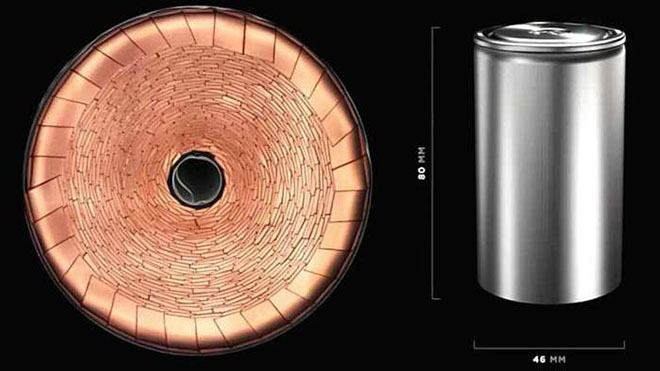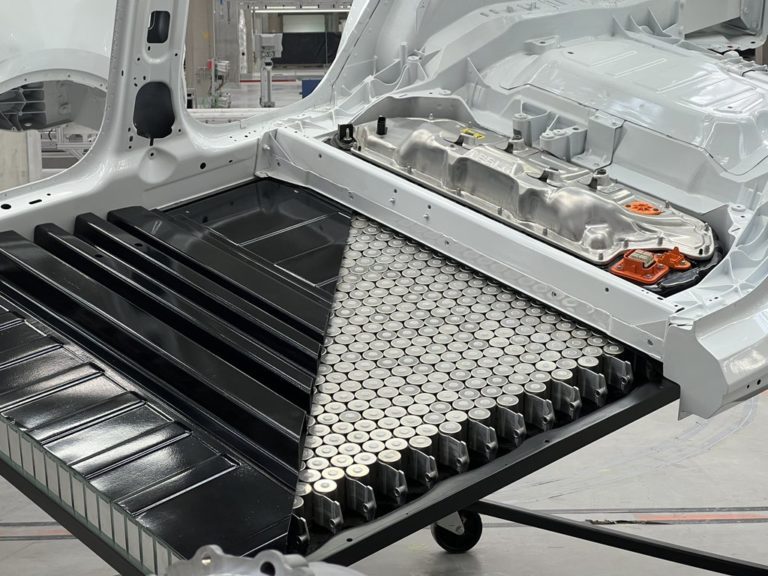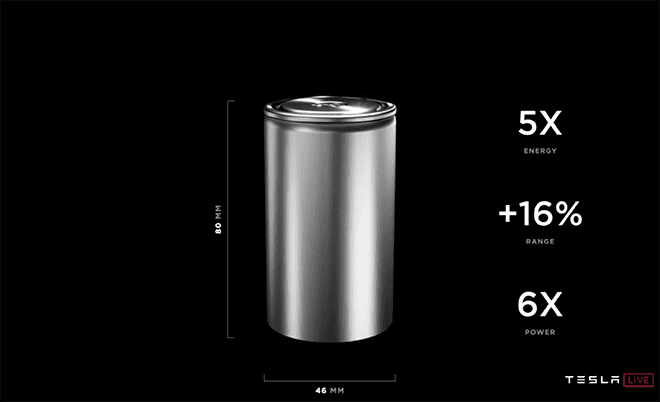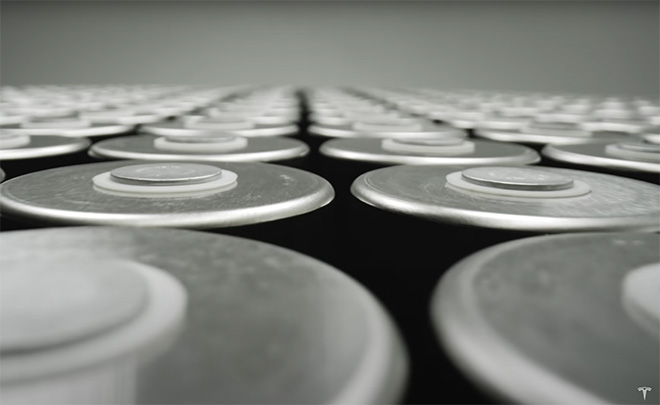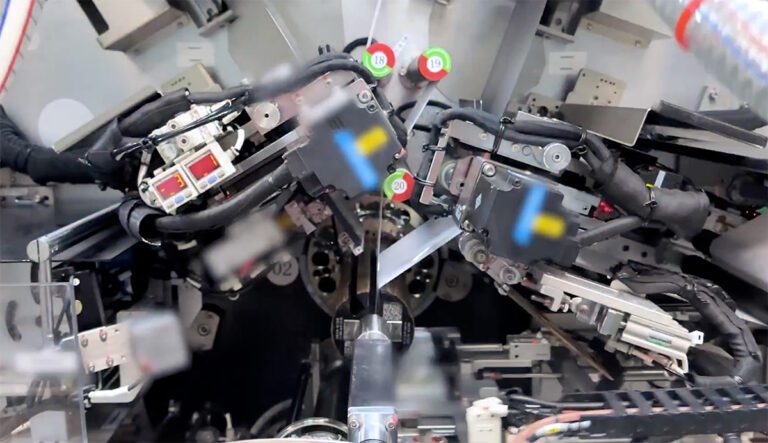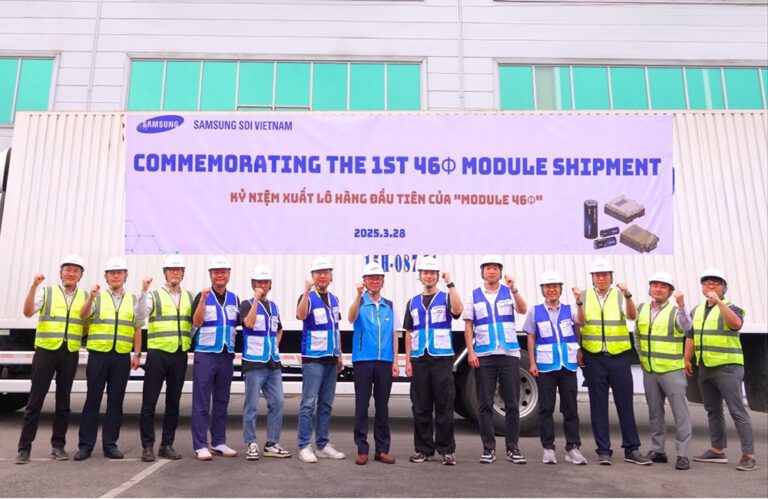Panasonic has been working on 4680 battery cells for Tesla for a year and a half now, and plans to begin full-scale production in Japan in 2023. Kazuo Tadanobu, CEO of Panasonic’s Energy Division, recently offered some details about the innovative cells in an interview with Bloomberg. Tadanobu stressed the difficulty of developing the new… Read more »
Search Results Found For: "4680 "
Panasonic to start producing 4680 battery cells for Tesla in 2023
Tesla’s new 4680 cell features a new chemistry that promises to boost efficiency and reduce costs. Now Panasonic says it is investing heavily in the development of the new cell, and plans to start mass production as early as 2023. The new cell is about twice the size of Tesla’s current 2170 cell, but has… Read more »
Panasonic reveals its version of the new Tesla 4680 battery cell
Tesla showed off its new 4680 cell—a tabless battery cell with a new chemistry that promises to boost efficiency and reduce costs—at 2020’s Battery Day event. Since then, several of the automaker’s battery suppliers have reportedly been working on production versions of the 4680 cell. Now Panasonic has unveiled its version of the Tesla 4680… Read more »
Tesla shows off new structural battery pack with 4680 cells at Giga Berlin
Tesla threw a party for the locals to celebrate the upcoming start of production at its Berlin Gigafactory. Kids of all ages dug the carnival rides, the giant Tesla coils shootin’ out sparks, and the obligatory pumpin’ sound-and-light show. For techies, however, the star of the show was Tesla’s new structural battery pack. A cutaway… Read more »
Several battery suppliers are working on Tesla’s 4680 cells
Tesla says its new 4680 battery cell, unveiled at the 2020 Battery Day event, represents a “massive breakthrough” that could enable a new generation of cheaper EVs. However, some industry experts have predicted that mass-producing the new cells will not be easy. Concurrently with developing the new cells, Tesla has been broadening its battery supply… Read more »
Panasonic: We have a competitive advantage in producing Tesla’s new 4680 battery cells
When Tesla unveiled its new 4680 battery cell at last September’s Battery Day event, it described the new cell as a “massive breakthrough” that could enable the production of a new generation of much cheaper EVs. Tesla is believed to be producing the cells on a pilot line at its Fremont plant, but is also… Read more »
LG to produce Tesla’s new 4680 battery cell at Korean factory
Tesla has recently introduced several battery innovations, including the new tabless 4680 cell, which it is believed to be producing in small quantities on a pilot line at its Fremont plant. However, the California carmaker has no intention of trying to produce all the cells it needs on its own. “The reason Tesla is doing… Read more »
LG Energy Solution, Tesla build LFP battery plants in the US
Lithium iron phosphate (LFP) batteries are all the rage these days. Although they offer lower energy density than batteries based on NMC (lithium nickel manganese cobalt) chemistries, they tend to be cheaper, and their ingredients are more readily available, less toxic and less controversial. Automakers including Ford and Stellantis are steadily building production capacity for… Read more »
Samsung SDI starts production of 46-series cylindrical batteries
South Korean battery and electronic material manufacturer Samsung SDI has started production of 46-series cylindrical batteries with a diameter of 46 mm. The modules will be initially supplied to an American customer for use in micro-mobility applications. Samsung SDI unveiled its 46-series lineup, consisting of four sizes—4680, 4695, 46100 and 46120—earlier this month. It plans… Read more »
Novacium’s silicon-anode batteries achieve 900+ cycle efficiency
France-based Novacium, partner of HPQ Silicon, a technology company specializing in engineering of silica- and silicon-based materials, has demonstrated high performance of its GEN3 silicon-anode material batteries. The company says its GEN3 silicon-anode material batteries demonstrate high capacity and durability, outperform commercial 18650 battery cells, achieve high average Coulombic Efficiency of 99.88% and deliver a… Read more »








